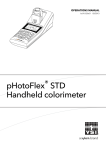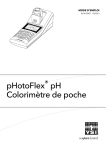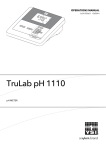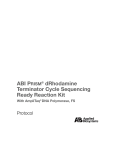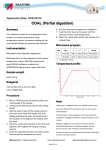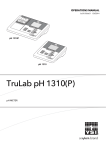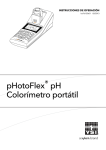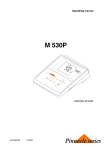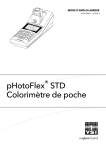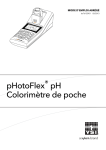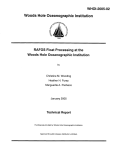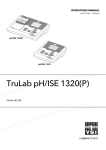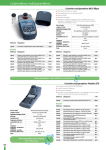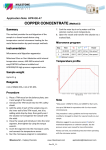Download pHotoFlex pH Handheld colorimeter
Transcript
OPERATIONS MANUAL ba76123e01 ® pHotoFlex pH Handheld colorimeter 02/2013 pHotoFlex® pH For the most recent version of the manual, please visit www.ysi.com. Contact Copyright 2 YSI 1725 Brannum Lane Yellow Springs, OH 45387 USA Tel: +1 937-767-7241 800-765-4974 Email: [email protected] Internet: www.ysi.com © 2013 Xylem Inc. ba76123e01 02/2013 pHotoFlex® pH Contents pHotoFlex® pH - Contents 1 Overview . . . . . . . . . . . . . . . . . . . . . . . . . . . . . . . . . . . . . . 7 1.1 1.2 1.3 1.4 1.5 2 Safety . . . . . . . . . . . . . . . . . . . . . . . . . . . . . . . . . . . . . . . 13 2.1 2.2 3 3.3 4.4 4.5 02/2013 13 13 13 13 14 14 14 14 Scope of delivery . . . . . . . . . . . . . . . . . . . . . . . . . . . . . . Power supply . . . . . . . . . . . . . . . . . . . . . . . . . . . . . . . . . 3.2.1 General information . . . . . . . . . . . . . . . . . . . . . . 3.2.2 Inserting/exchanging the batteries . . . . . . . . . . Initial commissioning . . . . . . . . . . . . . . . . . . . . . . . . . . . 15 15 15 17 18 Operation . . . . . . . . . . . . . . . . . . . . . . . . . . . . . . . . . . . . 19 4.1 4.2 4.3 ba76123e01 Safety information . . . . . . . . . . . . . . . . . . . . . . . . . . . . . 2.1.1 Safety information in the operating manual . . . . 2.1.2 Safety signs on the meter .............. 2.1.3 Further documents providing safety information Safe operation . . . . . . . . . . . . . . . . . . . . . . . . . . . . . . . . 2.2.1 Authorized use . . . . . . . . . . . . . . . . . . . . . . . . . 2.2.2 Requirements for safe operation . . . . . . . . . . . . 2.2.3 Unauthorized use . . . . . . . . . . . . . . . . . . . . . . . Commissioning . . . . . . . . . . . . . . . . . . . . . . . . . . . . . . . 15 3.1 3.2 4 General features . . . . . . . . . . . . . . . . . . . . . . . . . . . . . . . 7 Keypad . . . . . . . . . . . . . . . . . . . . . . . . . . . . . . . . . . . . . . . 8 Display . . . . . . . . . . . . . . . . . . . . . . . . . . . . . . . . . . . . . . 10 Socket field . . . . . . . . . . . . . . . . . . . . . . . . . . . . . . . . . . . 10 LabStation (optional) . . . . . . . . . . . . . . . . . . . . . . . . . . . 10 Switching on the meter . . . . . . . . . . . . . . . . . . . . . . . . . . 19 Inserting a cell . . . . . . . . . . . . . . . . . . . . . . . . . . . . . . . . 20 General operating principles . . . . . . . . . . . . . . . . . . . . . 22 4.3.1 Operating modes . . . . . . . . . . . . . . . . . . . . . . . . 22 4.3.2 Navigation . . . . . . . . . . . . . . . . . . . . . . . . . . . . . 22 4.3.3 Navigation example 1: Setting the language . . . 24 4.3.4 Navigation example 2: Setting the date and time 25 4.3.5 Menu overview . . . . . . . . . . . . . . . . . . . . . . . . . 28 System settings (System menu) . . . . . . . . . . . . . . . . . . 30 4.4.1 Measured value memory . . . . . . . . . . . . . . . . . . 31 4.4.2 Display . . . . . . . . . . . . . . . . . . . . . . . . . . . . . . . 33 4.4.3 Interface . . . . . . . . . . . . . . . . . . . . . . . . . . . . . . 33 4.4.4 Date/time . . . . . . . . . . . . . . . . . . . . . . . . . . . . . . 34 Photometry . . . . . . . . . . . . . . . . . . . . . . . . . . . . . . . . . . . 35 4.5.1 General information . . . . . . . . . . . . . . . . . . . . . . 35 4.5.2 Settings for photometric measurements . . . . . . 36 3 pHotoFlex® pH Contents 4.5.3 Measuring the concentration . . . . . . . . . . . . . . . 4.5.4 Blank value (reagent blank value) . . . . . . . . . . . 4.5.5 Standard adjustment (user calibration) . . . . . . . 4.5.6 Measuring the absorbance/transmission . . . . . . 4.5.7 Zero adjustment . . . . . . . . . . . . . . . . . . . . . . . . . 4.5.8 Programs . . . . . . . . . . . . . . . . . . . . . . . . . . . . . . 4.5.9 Analysis timer . . . . . . . . . . . . . . . . . . . . . . . . . . 4.5.10 Timer . . . . . . . . . . . . . . . . . . . . . . . . . . . . . . . . . 4.5.11 Measuring diluted samples . . . . . . . . . . . . . . . . 4.6 pH value / ORP voltage . . . . . . . . . . . . . . . . . . . . . . . . . 4.6.1 General information . . . . . . . . . . . . . . . . . . . . . . 4.6.2 Measuring the pH value . . . . . . . . . . . . . . . . . . . 4.6.3 Measuring the ORP voltage . . . . . . . . . . . . . . . . 4.6.4 Settings for pH and ORP measurements . . . . . 4.6.5 Calibration . . . . . . . . . . . . . . . . . . . . . . . . . . . . . 4.6.6 Carrying out the TEC and NIST/DIN calibration procedures . . . . . . . . . . . . . . . . . . . . . . . . . . . . . 4.7 Storing . . . . . . . . . . . . . . . . . . . . . . . . . . . . . . . . . . . . . . 4.7.1 Storing measurement datsets . . . . . . . . . . . . . . 4.7.2 Filtering measurement datsets . . . . . . . . . . . . . 4.7.3 Displaying measurement datsets . . . . . . . . . . . . 4.7.4 Downloading the measurement datsets to the RS232 interface . . . . . . . . . . . . . . . . . . . . . . . . . 4.7.5 Erasing stored measurement datasets . . . . . . . 4.8 Transmitting data (RS 232 interface) . . . . . . . . . . . . . . . 4.8.1 Connecting a PC . . . . . . . . . . . . . . . . . . . . . . . . 4.8.2 Configuring the RS232 interface . . . . . . . . . . . . 4.8.3 Selecting the output format of datasets . . . . . . . 4.8.4 Transmitting data . . . . . . . . . . . . . . . . . . . . . . . . 4.9 Reset . . . . . . . . . . . . . . . . . . . . . . . . . . . . . . . . . . . . . . . 4.9.1 Resetting the system settings . . . . . . . . . . . . . . 4.9.2 Resetting the photometry settings . . . . . . . . . . . 4.9.3 Resetting the pH settings . . . . . . . . . . . . . . . . . . 4.10 Meter information . . . . . . . . . . . . . . . . . . . . . . . . . . . . . . 4.11 Software update . . . . . . . . . . . . . . . . . . . . . . . . . . . . . . . 4.12 Administrating user-defined methods . . . . . . . . . . . . . . . 4.12.1 Administrating user-defined programs with a terminal program . . . . . . . . . . . . . . . . . . . . . . . . 5 56 60 61 62 63 63 64 64 64 65 65 67 68 68 69 69 70 70 71 72 Maintenance, cleaning, disposal . . . . . . . . . . . . . . . . . 77 5.1 5.2 4 37 38 41 43 44 46 47 47 48 49 49 50 51 51 53 Maintenance . . . . . . . . . . . . . . . . . . . . . . . . . . . . . . . . . . 5.1.1 Inserting/exchanging the batteries . . . . . . . . . . . 5.1.2 Retrofitting the rechargeable battery . . . . . . . . . Cleaning . . . . . . . . . . . . . . . . . . . . . . . . . . . . . . . . . . . . . 5.2.1 Cleaning the cell shaft . . . . . . . . . . . . . . . . . . . . 5.2.2 Cleaning the cells . . . . . . . . . . . . . . . . . . . . . . . ba76123e01 77 77 78 79 79 80 02/2013 pHotoFlex® pH Contents 5.3 5.4 6 What to do if... . . . . . . . . . . . . . . . . . . . . . . . . . . . . . . . . 81 6.1 6.2 6.3 7 General data . . . . . . . . . . . . . . . . . . . . . . . . . . . . . . . . . 85 Photometry . . . . . . . . . . . . . . . . . . . . . . . . . . . . . . . . . . . 87 pH value / ORP voltage . . . . . . . . . . . . . . . . . . . . . . . . . 88 Accessories, options . . . . . . . . . . . . . . . . . . . . . . . . . . . 89 8.1 8.2 9 General errors . . . . . . . . . . . . . . . . . . . . . . . . . . . . . . . . 81 Photometry . . . . . . . . . . . . . . . . . . . . . . . . . . . . . . . . . . . 82 pH value / ORP voltage . . . . . . . . . . . . . . . . . . . . . . . . . 82 Technical data . . . . . . . . . . . . . . . . . . . . . . . . . . . . . . . . 85 7.1 7.2 7.3 8 Packing . . . . . . . . . . . . . . . . . . . . . . . . . . . . . . . . . . . . . 80 Disposal . . . . . . . . . . . . . . . . . . . . . . . . . . . . . . . . . . . . . 80 Accessories . . . . . . . . . . . . . . . . . . . . . . . . . . . . . . . . . . 89 8.1.1 Connection cable . . . . . . . . . . . . . . . . . . . . . . . 89 Optional extensions of the pHotoFlex® pH . . . . . . . . . . 89 Lists . . . . . . . . . . . . . . . . . . . . . . . . . . . . . . . . . . . . . . . . . 91 10 Index . . . . . . . . . . . . . . . . . . . . . . . . . . . . . . . . . . . . . . . . 97 11 Firmware update . . . . . . . . . . . . . . . . . . . . . . . . . . . . . . 99 12 Contact Information . . . . . . . . . . . . . . . . . . . . . . . . . . . 101 12.1 Ordering & Technical Support . . . . . . . . . . . . . . . . . . . 101 12.2 Service Information . . . . . . . . . . . . . . . . . . . . . . . . . . . 101 ba76123e01 02/2013 5 Contents 6 pHotoFlex® pH ba76123e01 02/2013 pHotoFlex® pH Overview 1 Overview 1.1 General features The compact pHotoFlex® pH handheld precision meter enables you to carry out the following measurements quickly and reliably: Photometric measurements – Concentration measurements (colorimetric measurements) – Absorbance measurements – Transmission measurements pH measurements. The pHotoFlex® pH handheld meter provides the maximum degree of operating comfort, reliability and measuring certainty for all applications. The proven MultiCal ® calibration procedure supports you when calibrating for pH measurements and the AutoRead function enables precise pH measurements. 4 3 2 1 ba76123e01 02/2013 1 Keypad 2 Display 3 Cell shaft (folded out for a 16 mm cell to be inserted) 4 Socket field 7 pHotoFlex® pH Overview 1.2 Keypad . Key functions Select the measuring mode <M> (long keystroke): – Photometry – pH & ORP Select the measured parameter within a measuring mode <M> (short keystroke): – pH & ORP: pH, ORP – Photometry: Concentration, Absorbance, % Transmission Start calibration (measuring mode pH & ORP) Start zero adjustment or blank value measurement using the Photometry \ Adjustment menu (measuring mode, Photometry) <CAL/ZERO> In the Photometry measuring mode: Select a program for concentration measurement <PROG> . Open menus / confirm entries / start measurement <START/ENTER> Call up the Configuration menu (all settings are made here) <MENU> 8 ba76123e01 02/2013 pHotoFlex® pH Overview In the Photometry measuring mode, measured parameter, Concentration: switch over between available citation forms <FORM> In the Photometry measuring mode, measured parameter, Concentration: Switch over between available units <UNIT> Switch the measuring instrument on/off <ON/OFF> PRT Output display contents to RS232 interface <PRT> Open the Store menu <STO>, Quick storing <STO> <STO> Highlight menu items or selection Set values <>, <> Switch to the next higher menu level / cancel input <ESC> Keys with an additional number printed on are assigned doubly. This enables to directly enter numbers in special menus. Thus, you can, for example, conveniently enter the date and time via the number keys. ba76123e01 02/2013 9 pHotoFlex® pH Overview 1.3 Display The graphic display shows all information of the current measurement in the measured value display. The illumination enables to read the display even in the darkness. Example Measuring mode \ measured parameter Photometry \ Concentration 1.29 mg/l NH4-N 2: A5/25 MC 16 mm 01.02.05 15:12 1.4 Program and citation form Diameter of the cell and measuring range Status line with date and time 0.20 - 8.00 mg/l Socket field 1 Identifying the connectors Measured value (with unit) 2 3 4 5 1 pH electrode 2 pH temperature sensor 3 Power pack (9 V DC, see section 7.1) 4 Contacts for operation on the LabStation 5 RS232 serial interface 1.5 LabStation (optional) The LabStation, which is available as an accessory, enables you to use the pHotoFlex® pH conveniently in the laboratory (see LabStation operating manual). 10 ba76123e01 02/2013 pHotoFlex® pH Overview Laboratory operation with the LabStation enables the following additional functions: With photometric measurements, the zero measurement is retained even after switching the pHotoFlex® pH off and on again You can connect a bar code reader for the simplified calling up of programs The LSdata software included serves to easily enter user-defined programs Operation with power pack and rechargeable battery (included in the scope of delivery of the LabStation). The rechargeable battery in the pHotoFlex® pH is automatically charged as soon as the meter is placed in the LabStation. ba76123e01 02/2013 11 Overview 12 pHotoFlex® pH ba76123e01 02/2013 pHotoFlex® pH Safety 2 Safety 2.1 Safety information 2.1.1 Safety information in the operating manual This operating manual provides important information on the safe operation of the meter. Read this operating manual thoroughly and make yourself familiar with the meter before putting it into operation or working with it. The operating manual must be kept in the vicinity of the meter so you can always find the information you need. Important safety instructions are highlighted in this operating manual. They are indicated by the warning symbol (triangle) in the left column. The signal word (e.g. "Caution") indicates the level of danger: CAUTION indicates a possibly dangerous situation that can lead to slight (reversible) injury if the safety instruction is not followed. NOTE indicates a possibly dangerous situation where goods might be damaged if the actions mentioned are not taken. 2.1.2 Safety signs on the meter Note all labels, information signs and safety symbols on the meter and in the battery compartment. A warning symbol (triangle) without text refers to safety information in this operating manual. 2.1.3 Further documents providing safety information Observe the safety datasheets of the test reagents when working with photometric test sets. ba76123e01 02/2013 13 pHotoFlex® pH Safety 2.2 Safe operation CAUTION Danger of eye damage by visible and invisible LED radiation. In the cell shaft there are light emitting diodes (LED) of the 1M class. Do not look at the radiation using optical instruments. With normal, authorized use there is no hazard. 2.2.1 Authorized use This meter is authorized exclusively for the following measurements: Analysis of substances in water and aqueous solutions using round cells Concentration measurement Absorbance and transmission measurement The fields of application are mobile use and use in the laboratory. Only the operation and running of the meter according to the instructions and technical specifications given in this operating manual is authorized (see chapter 7 TECHNICAL DATA). Any other use is considered unauthorized. 2.2.2 Requirements for safe operation Note the following points for safe operation: The meter may only be operated according to the authorized use specified above. The meter may only be supplied with power by the energy sources mentioned in this operating manual. The meter may only be operated under the environmental conditions mentioned in this operating manual. The meter may only be opened if this is explicitly described in this operating manual (example: Inserting the batteries). 2.2.3 Unauthorized use The meter must not be put into operation if: it is visibly damaged (e.g. after being transported) it was stored under adverse conditions for a lengthy period of time (storing conditions, see chapter 7 TECHNICAL DATA). 14 ba76123e01 02/2013 pHotoFlex® pH Commissioning 3 Commissioning 3.1 Scope of delivery Handheld meter, pHotoFlex® pH 4 batteries, 1.5 V type AA (in the battery compartment) 1 empty cell 16 mm 2 empty cells 28 mm Microfiber cloth to clean the meter Quick start guide English Key overview / Program list CD-ROM with – detailed operating manual – photometry analysis manual with analysis specifications – software to program user-defined methods Optional: Rechargeable battery Optional: LabStation with LSdata PC software, rechargeable battery and universal power pack The optional parts of the scope of delivery are available as accessories (see section 8.1). 3.2 Power supply 3.2.1 General information You can operate the meter either with batteries, rechargeable batteries or a power pack. The power pack supplies the meter with low voltage (9 V DC). At the same time, the rechargeable battery is charged. The rechargeable battery is charged even while the meter is switched off. The LoBat display indicator appears when the batteries or rechargeable batteries is nearly discharged. Charging time of the rechargeable battery approx. 36 hours. CAUTION Use original power packs only. The line voltage at the operating site must lie within the input voltage range of the original power pack (see chapter 7 TECHNICAL DATA). The rechargeable battery should not be completely discharged. If you do not operate the instrument for a longer period of time you should charge the rechargeable battery every six months. ba76123e01 02/2013 15 pHotoFlex® pH Commissioning Automatic switchoff The meter has an automatic switch-off function in order to save the batteries or rechargeable battery (see section 4.4). Display illumination During operation with batteries or rechargeable battery the meter automatically switches off the display illumination if no key is pressed for 30 seconds. The illumination is switched on with the next keystroke again. The display illumination can also be switched off completely (see section 4.4.2). Power pack and rechargeable battery are available as an accessory (see section 8.1). Connecting the power pack (optional) 4 3 2 1 16 1 If necessary, replace the Euro plug (1) on the power pack (2) by the country-specific plug suitable for your country. 2 Connect the plug (3) to the socket (4) of the meter. 3 Connect the power pack to an easily accessible power socket. ba76123e01 02/2013 pHotoFlex® pH Commissioning 3.2.2 Inserting/exchanging the batteries NOTE Make sure that the poles of the batteries are positioned correctly. The ± signs on the batteries must correspond to the ± signs in the battery compartment. 1 2 1 Open the battery compartment: – Unscrew the two screws (1) on the underside of the meter, – Remove the lid of the battery compartment (2). ba76123e01 02/2013 2 If necessary, take four old batteries out of the battery compartment. 3 Insert four batteries (3) in the battery compartment. 4 Close the battery compartment and fix it with the screws. 17 pHotoFlex® pH Commissioning 3.3 Initial commissioning Perform the following activities: For – Battery operation: Insert the batteries (see section 3.2.2) – Rechargeable battery operation: insert the rechargeable battery (see section 5.1.2) – line power operation and charging the rechargeable battery: connect the power pack (see section 3.2) – Operation with LabStation and rechargeable battery: Insert the rechargeable battery, connect the LabStation and insert the meter in the LabStation (see LabStation operating manual) Switch on the meter (see section 4.1) Set the language as necessary (see section 4.3.3) Set the date and time as necessary (see section 4.3.4) When you set the language, date and time according to the mentioned sections of this operating manual you will quickly become familiar with the simple operation of the pHotoFlex® pH. 18 ba76123e01 02/2013 pHotoFlex® pH Switching on Operation 4 Operation 4.1 Switching on the meter Press the <ON/OFF> key. For 30 seconds, Start menu appears with a selection of the measuring modes. The measuring mode last selected is highlighted. The status line indicates the meter designation and the version number of the software. Start Photometry pH & ORP i pHotoFlex V 0.24 After a few seconds, the meter automatically switches to the measuring mode and measured parameter used last. The measured value display appears (here, e.g. measuring mode Photometry). Photometry \ Concentration i Select program with <PROG> 01.02.05 15:12 With <M> (long pressure) change the measuring mode. With <M> (short pressure) toggle between the different measured parameters in the selected measuring mode. Switching off Automatic switchoff Press the <ON/OFF> key. The meter has an automatic switchoff function in order to save the batteries or rechargeable battery (see section 4.4). The automatic switchoff switches the meter off if no key is pressed for an adjustable period. The automatic switchoff is not active if the power is supplied by the power pack (optional), if the power is supplied by the LabStation (optional), if the Timer or Analysis timer function is on. ba76123e01 02/2013 19 pHotoFlex® pH Operation Display illumination with battery and rechargeable battery operation During operation with batteries or rechargeable battery the meter automatically switches off the display illumination if no key is pressed for 30 seconds. The illumination is switched on again with the next keystroke. 4.2 Inserting a cell To be able to insert cells in the pHotoFlex® pH, the cell shaft has to be prepared to take in a cell. 1 Push the dust cover (1) upward. The cell shaft for 28 mm cells is open. Insert a 28 mm cell (see below) Insert a 16 mm cell (see page 20) 1 Inserting a 28 mm cell Inserting a 16 mm cell 20 2 Insert the cell so that it is positioned on the bottom of the cell shaft. The cell is ready to be measured. 1 Put the fold-out cell shaft (2) in an upright position until it locks into place. ba76123e01 02/2013 pHotoFlex® pH Operation 2 2 Pull up the height adapter (3). The cell shaft is extended. 3 3 Open the external light cover (4) of the cell shaft. 4 Insert the 16 mm cell (marking points forward) so that it is positioned on the bottom of the cell shaft. 5 Close the external light cover (4). The cell is ready to be measured. 4 ba76123e01 02/2013 21 pHotoFlex® pH Operation For optimum measurement results, the cell must always be covered by the external light cover. Otherwise, external light can falsify the measurement result. 4.3 General operating principles This section contains basic information on the operation of the pHotoFlex® pH. Operating elements, display Operating modes, navigation An overview of the operating elements and the display is given in section 1.2 and section 1.3. An overview of the operating modes of the pHotoFlex® pH and the navigation through menus and functions can be found in section 4.3.1 and section 4.3.2. 4.3.1 Operating modes The instrument has the following operating modes: Measurement The display indicates measurement data in the measured value display Calibration The display indicates a calibration process with calibration information, or a process to carry out a zero adjustment Data transmission The meter transmits measuring datasets or calibration records to the serial interface Configuration The display indicates a menu with further menus, settings and functions 4.3.2 Measured value display Navigation In the measured value display, you can select a measuring mode with <M> (long pressure) select a measured parameter in the active measuring mode (e. g. pH <−> mV) with <M> (short pressure) open the menu with <MENU> switch to the superordinate Start menu with <ESC>. 22 ba76123e01 02/2013 pHotoFlex® pH Menus and dialogs Operation The menus for settings and dialogs in courses contain further submenus. The selection is made with the <> <> keys. The current selection is highlighted as white text on a black background. Menus The name of the menu is displayed at the upper edge of the frame. Menus are opened by confirming with <START/ENTER>. Example: Configuration Photometry pH & ORP System Info Settings Settings are indicated by a colon. The current setting is displayed on the right-hand side. With <START/ENTER>, the selection of the possible settings is opened. Subsequently, the setting can be changed with <> <> and <START/ENTER>. Example: System Language: Beep: English Off Illumination: Contrast: On 48 % Temperature unit: °C Switchoff time: 30 min Functions Functions are designated by the name of the function. They are immediately carried out by confirming with <START/ENTER>. Example: display the Calibration record function (in the pH & ORP / Calibration menu). pH & ORP Calibration record Cal. type: TEC Calibration interval: AutoCal Unit for slope: :i 2.00 4.01 7.00 10.01 ba76123e01 02/2013 007 d mV/pH 23 pHotoFlex® pH Operation Messages Information or instructions are marked by the i symbol. They cannot be selected. Example: pH & ORP i Buffer recognition TEC i Immerse sensor in buffer 1 Set temperature: Continue 25 °C The i symbol indicates info texts, e.g. messages, notes or instructions The principles of navigation are explained in the two following sections by reference of examples: Setting the language (section 4.3.3) Setting the date and time (section 4.3.4). 4.3.3 Navigation example 1: Setting the language The following example describes in the language of the country how to set the language. On delivery, English is set as the language in the pHotoFlex® pH. During initial commissioning, the language is set in the menu, Configuration / System / Language. 1 In the measured value display: Open the Configuration menu with <MENU>. The instrument is in the configuration mode. 2 Select the System menu with <> <>. The current selection is highlighted as white text on a black background. 3 Open the System menu with <START/ENTER>. System Language: Store English Display Reset Interface Continue ... 24 ba76123e01 02/2013 pHotoFlex® pH Operation 4 Select the Language menu with <> <>. The current selection is highlighted as white text on a black background. 5 Open the setting of the Language with <START/ENTER>. System Language: Deutsch Store Display Reset Interface Continue ... 6 Select the required language with <> <>. 7 Confirm the setting with <START/ENTER>. The setting is active. The menu is displayed in the selected language. 8 To make further settings, switch to the next higher menu level with <ESC>. or Switch to the measured value display with <M> (short pressure). The instrument is in the measurement mode. 4.3.4 Navigation example 2: Setting the date and time The meter has a clock with a date function. The date and time are indicated in the status line of the measured value display. When storing measured values and calibrating, the current date and time are automatically stored as well. Numerals are generally entered via the number keys. The correct setting of the date and time and date format is important for the following functions and displays: Current date and time Calibration date Identification of stored measured values. Therefore, check the time at regular intervals. ba76123e01 02/2013 25 pHotoFlex® pH Operation After a fall of the supply voltage (empty batteries or rechargeable battery), the date and time are reset to 01.01.2003, 00:00 hours. Setting the date, time and date format The data format can be switched from the display of day, month, year (dd.mm.yy) to the display of month, day, year (mm/dd/yy or mm.dd.yy). 1 In the measured value display: Open the Configuration menu with <MENU>. The instrument is in the configuration mode. 2 Select and confirm the System / Continue ... / Date/time menu with <> <> and <START/ENTER>. Date/time Time: 14:53:40 Date: 30.10.03 Date format: dd.mm.yy 3 Select and confirm the Time menu with <> <> and <START/ENTER>. A display for the entry of numerals with the number keys opens up. Time 14:53:40 4 Enter the time using the number keys. The digit to be changed is displayed underlined. In the case of wrong entries, you can cancel the procedure with <ESC>. After canceling with <ESC>, it is possible to enter all digits once again. The new digits are only taken over by confirming with <START/ENTER>. 5 26 Confirm the setting with <START/ENTER>. The time is set. ba76123e01 02/2013 pHotoFlex® pH ba76123e01 02/2013 Operation 6 Set the current Date as necessary. The setting is made similarly to that of the time. 7 Change the date format as necessary. 8 To make further settings, switch to the next higher menu level with <ESC>. or Switch to the measured value display with <M> (short pressure). The instrument is in the measurement mode. 27 pHotoFlex® pH Operation 4.3.5 Photometry Menu overview Measured parameter Concentration % Transmission Absorbance Programs Dilution Analysis timer On Off Reset pH & ORP Measured parameter pH ORP Calibration Calibration record Cal. type TEC NIST/DIN Calibration interval 1 ... 999 d Unit for slope mV/pH % Man. temperature -20 ... +130 °C Temperature unit °C, °F Reset Timer (Continued next page) 28 ba76123e01 02/2013 pHotoFlex® pH System Operation Language Deutsch English Français Español Measured value memory Display RS232 download Data filter Filter ID PROG Date Delete i 4 of 1000 occupied i Filter: No filter Display Illumination Auto off On Off Contrast 0 ... 100 % Brightness 0 ... 100 % Baud rate 1200, 2400, 4800, 9600, 19200 Output format ASCII CSV Time hh:mm:ss Reset Interface Continue ... / Date/time Date Date format Continue ... / Switchoff time 10, 20, 30, 40, 50 min, 1, 2, 3, 4, 5, 10, 15, 20, 24 h Continue ... / Beep On Off dd.mm.yy mm.dd.yy mm/dd/yy Info ba76123e01 02/2013 29 pHotoFlex® pH Operation 4.4 System settings (System menu) The following instrument features and general functions can be found in the Configuration / System menu: Language selection (Language) Memory and database functions (Store) Display settings (Display) Restore basic settings (Reset) Configuration of the interface for PC(Interface) Setting the date/time (Date/time) Setting the switch-off time (Switchoff time) Setting the keyboard sound (Beep) Settings/functions 30 The settings can be found in the Configuration / System menu. To switch to the Configuration menu, press the <MENU> key. Menu item Setting Description Language Deutsch English Français Español Select the language (see section 4.3.3) Store Display RS232 download Data filter Delete Memory and database functions (see section 4.7.2) Display Illumination Contrast Brightness Switch on/off the display illumination (see section 4.4.2) Reset - Resets all system settings to default (see section 4.9.1) Interface Baud rate Output format Baud rate of the data interface (see section 4.4.3) Continue ... / Date/time Time Date Date format Settings of time and date (see section 4.3.4) ba76123e01 02/2013 pHotoFlex® pH Operation Menu item Setting Description Continue ... / Switchoff time 10, 20, 30, 40, 50 min, 1, 2, 3, 4, 5, 10, 15, 20, 24 h The automatic switchoff switches the meter off if no entry is made for a specified period of time (Switchoff time). This saves the batteries or rechargeable battery. Continue ... / Beep On Off Switch on/off the beep on keystroke 4.4.1 Measured value memory In the Measured value memory menu, you find functions to display and edit the stored measurement datasets: Display the measurement datsets on the screen (Display) Download the measurement datsets to the RS232 interface (RS232 download) Set up filter rules for the stored measurement datsets (Data filter) Erase all stored measurement datsets (Delete) Information on the number of occupied memory locations The settings can be found in the Configuration / System / Measured value memory menu. To switch to the Configuration menu, press the <MENU> key. ba76123e01 02/2013 31 pHotoFlex® pH Operation Settings/functions Menu item Setting/function Description Display - Displays in pages all measurement datasets that correspond to the filter settings. Further options: Scroll through the datasets with <> <>. Output the displayed dataset to the interface with <PRT>. Quit the display with <ESC>. RS232 download - Downloads to the interface all measurement datasets that correspond to the filter settings. The download is ordered according to the date and time. The process can take several minutes. To terminate the process prematurely, press <ESC>. Data filter see section 4.7.2 Allows to set filter criteria in order to display and download datasets to the interface. Delete - Erases the entire contents of the measuring data memory, independent of the filter settings. Note: All calibration data remains stored when performing this action. All details on the subjects of memory and stored data is found in section 4.7.2. 32 ba76123e01 02/2013 pHotoFlex® pH Operation 4.4.2 Display In the Configuration / System / Display menu, you set the display features: Switching on/off the display illumination (Illumination) Display contrast (Contrast) The settings can be found in the Configuration / System / Display menu. To switch to the Configuration menu, press the <MENU> key. Settings Menu item Setting Description Illumination Auto off The display illumination is automatically switched off if no key has been pressed for 30 seconds. On Off Switches the display illumination on or off permanently (see section 4.5.9) Contrast 0 ... 100 % Changes the display contrast Brightness 0 ... 100 % Changes the display brightness 4.4.3 Interface In the Interface menu, you set the features of the interface: Transmission speed (Baud rate) Output format (Output format) The settings can be found in the Configuration / System / Interface menu. To switch to the Configuration menu, press the <MENU> key. Settings ba76123e01 02/2013 Menu item Setting Description Baud rate 1200, 2400, 4800, 9600, 19200 Baud rate of the data interface Output format ASCII CSV Output format for data transmission For details, see section 4.8 33 pHotoFlex® pH Operation 4.4.4 Date/time In the Configuration / System / Continue ... / Date/time menu, you set the system clock: Current time (Time) Current date (Date) Format of the date display (Date format) The settings can be found in the Configuration / System / Continue ... Date/time menu. To switch to the Configuration menu, press the <MENU> key. Settings Menu item Setting Description Time hh:mm:ss Enter the time with the number keys Date Date format 34 Enter the date with the number keys dd.mm.yy mm.dd.yy mm/dd/yy Settings of time and date. ba76123e01 02/2013 pHotoFlex® pH Operation 4.5 Photometry 4.5.1 General information Photometric measurements serve to determine chemical substances in liquid samples. For this determination, the substance to be determined has to be present in a form that is suitable for photometric measurement. At the same time, possible disturbing factors have to be excluded. Before measurement, the sample has to be pretreated in order to bring the substance to be determined into the form that is suitable for measurement and at the same time exclude disturbing factors. Pretreatment of the sample is described in the analysis specification. In a simple case, pretreatment can be to dissolve a solid substance in water; it can, however, also include chemical conversions, e. g. a digestion. The chemicals required in the analysis specification are available as test sets. Suitable analysis specifications for test sets can be found in the photometry analysis manual (on CD-ROM). There you will also find further instructions on handling chemicals and on how to proceed when applying the analysis specifications. Methods and the corresponding method data for many test sets are stored as programs in the pHotoFlex® pH. A program number is assigned to each program. By entering the program number or by using a barcode reader the stored method data is loaded. You can look up an overview of the available methods in the photometry analysis manual and display it on the screen of the pHotoFlex® pH (see section 4.5.8). You can measure the following parameters with the pHotoFlex® pH: Concentration [mg/l] % Transmission [] Absorbance [] ba76123e01 02/2013 35 pHotoFlex® pH Operation Preparatory activities Perform the following preparatory activities when you want to measure: 1 Clean the cells before filling them with sample and also before measuring as necessary (see section 5.2.2). The cells must be absolutely clean and free of scratches. 2 For measurement, place the pHotoFlex® pH on a horizontal surface. 4.5.2 Settings for photometric measurements For photometric measurements, the following settings are available in the Configuration / Photometry menu: Setting the measured parameter Displaying a list of all programs Setting the dilution factor Switching on or off the analysis timer Resetting the settings for photometric measurements The settings can be found in the Configuration / Photometry menu. To switch to the Configuration menu, press the <MENU> key. Settings Menu item Setting Description Measured parameter Concentration % Transmission Absorbance Measured parameters in the Photometry measuring mode Programs Display all programs with the corresponding program data (see section 4.5.8). Dilution Set the dilution factor (see section 4.5.11) Analysis timer Reset 36 On Off Switch on/off the analysis timer (see section 4.5.9) Reset all settings for the Photometry measuring mode (see section 4.9.3) ba76123e01 02/2013 pHotoFlex® pH Operation 4.5.3 Measuring the concentration 1 Press the <M> key (long pressure) repeatedly until the Photometry measuring mode is selected. 2 Press the <M> key (short pressure) repeatedly until the measured variable, Konzentration is selected. First concentration measurement with the pHotoFlex® pH Second and all further concentration measurements Photometry \ Concentration Photometry \ Concentration i Select program with <PROG> i Select program with <PROG> or with ▲ ▼ 1: A5/25 MC 16 mm 01.02.05 15:12 NH4-N 0.20 - 6.51 mg/l 01.02.05 15:12 From the second concentration measurement, the data of the program last used is automatically displayed here. With <> <> you can quickly switch between the ten programs last used. To select a program, you can also read in the program number of an analysis specification with a barcode reader (see section 8.2). The following step 3 is then skipped. You can directly start measurement. The program number of the test is given in the analysis specification, on the list of available programs and on the packing of some tests (under the barcode). 3 Open the Program number display with <PROG>, enter the required program number with the number keys and confirm with <START/ENTER>. or (from the second concentration measurement): Select a program out of the last ten programs with <> <>. The program data is displayed. If a program number is selected that requires a measured blank value, the menu automatically guides to the blank value measurement. ba76123e01 02/2013 37 pHotoFlex® pH Operation Photometry \ Concentration i Insert sample i Start measurement with <START> 1: A5/25 MC 16 mm NH4-N 0.20 - 6.51 mg/l 01.02.05 15:12 4 Insert the cell (see section 4.2). 5 Start the measurement with <START/ENTER>. Measurement is started. The result is displayed. Photometry \ Concentration [BV] 0.74 1: A5/25 MC 16 mm 4.5.4 A blank value measured by the user is used mg/l NH4-N 0.20 - 6.51 mg/l 01.02.05 15:12 Blank value (reagent blank value) A blank value is required for every concentration measurement. For some programs (methods) for concentration measurement, the blank values are already stored in the meter. They are used automatically. For all other programs, the blank value has to be determined separately before the first measurement. Each stored reagent blank value can be replaced by a blank value determined by the user. You will find more information on blank values in the photometry analysis manual. A blank value is always stored for the program that has just been called up. It remains stored until it is erased (menu item, Delete blank value) or overwritten. The Reset function erases all blank values measured by the user and restores the blank values stored in the factory. If a blank value measured by the user is stored for a program, this blank value is used for measurement. The usage of the blank value measured by the user is documented and also indicated in the measured value display. 38 ba76123e01 02/2013 pHotoFlex® pH Measuring the blank value Operation 1 Press the <M> key (long pressure) repeatedly until the Photometry measuring mode is selected. 2 Press the <M> key (short pressure) repeatedly until the measured variable, Concentration is selected. 3 Select a program with <PROG> as necessary. The following measurement of the blank value applies only to the selected program. If no program is selected, the message i No program selected. appears on the display. 4 Open the adjustment menu with <CAL/ZERO>. Photometry \ Adjustment Zero adjust. Measure blank value Delete blank value 5 Using <> <> and <START/ENTER>, select and start the Measure blank value function. The menu-guided blank value measurement starts. Follow the instructions on the display. Measure blank value i 2: A5/25 MC i Cell = 16 mm i Insert blank sample Start measurement ba76123e01 02/2013 6 Insert a cell with blank sample (see section 4.2). 7 Start the measurement of the blank value with <START/ENTER>. After measuring, the result of the blank value measurement is displayed and stored. The result is displayed as i Blank value measurement successful! or i Blank value measurement erroneous! 39 pHotoFlex® pH Operation Measure blank value i 2: A5/25 MC i Cell = 16 mm i Absorbance = 0.301 i Blank value measurement successful! 8 40 Confirm the result with <START/ENTER>. The blank value measurement is completed. The meter is ready to measure. or: Discard the result with <ESC>. Subsequently, carry out a new blank value measurement. ba76123e01 02/2013 pHotoFlex® pH Operation 4.5.5 Standard adjustment (user calibration) With some of the programs (methods) for concentration measurement, you can optimize the calibration curve stored in the meter with the aid of the Standard adjustment function. A standard adjustment is only valid if the deviation compared to the original calibration is no more than 30%. A standard adjustment is always stored for the program that is presently called up. A standard adjustment is only deleted if a new standard adjustment is carried out the standard adjustment is erased manually the meter is reset to delivery status (Reset function) Standard adjustment 1 If necessary, press the <M> key several times until the measured parameter Concentration is selected. 2 Select a program with <PROG> as necessary. The following measurement of the standard applies only to the selected program. 3 Using <CAL/ZERO>, open the Photometry \ Adjustment menu. Photometry \ Adjustment Zero adjust. Measure blank value Delete blank value Standard adjustment 4 Open the Standard adjustment menu with <> <> and <START/ENTER>. If data of a standard adjustment are already available, the data of the last standard adjustment are displayed. Here you can also erase the data of an active standard adjustment. 5 ba76123e01 02/2013 Using <> <> and <START/ENTER>, select and start the Measure standard function. The menu-guided standard measurement begins. Follow the instructions on the display. 41 pHotoFlex® pH Operation Enter nominal value mg/l Cu _ 6 Enter the nominal value of the standard. Note: Enter the decimal separator with <START/ENTER>. 7 Confirm the entered nominal value with <START/ENTER>. 8 Insert a cell with standard (see section 4.2). 9 Start the measurement of the standard with <START/ENTER>. After measuring, the result of the standard adjustment is displayed and stored. As the result, the measured value and the adjustment (in %) or Error is displayed. Measure standard i304: Cu-1 TP Celli = 10 mm i 0.600 mg/l Cu: 2.000 (93.2%) Accept 10 Confirm the result with <START/ENTER>. The standard adjustment is completed. The meter is ready to measure. or: Discard the result with <ESC>. Subsequently, carry out a new standard adjustment. If a standard adjustment is stored for a program, the standard adjustment is automatically used for measurement. The usage of the standard adjustment is documented together with the measured value and indicated in the measured value display with [Cal]. 42 ba76123e01 02/2013 pHotoFlex® pH Operation 4.5.6 Measuring the absorbance/transmission The transmission measurement is not described separately in the following example as it operates in exactly the same way as the absorbance measurement. The result of the measurement is displayed in % Transmission. 1 Press the <M> key (long pressure) repeatedly until the Photometry measuring mode is selected. 2 Press the <M> key (short pressure) repeatedly until the measured variable, Absorbance or % Transmission is selected. Photometry \ Absorbance i Select cell with ▲ ▼ 16 mm 610 nm 01.02.05 15:12 3 Select the cell diameter with <> <> and confirm with <START/ENTER>. 4 Select the wavelength with <> <> and confirm with <START/ENTER>. Photometry \ Absorbance i Insert sample i Start measurement with <START> 16 mm ba76123e01 02/2013 610 nm 01.02.05 15:12 5 Clean the cell (see section 5.2.2). 6 Insert the cell (see section 4.2). 7 Start the measurement with <START/ENTER>. The measurement result is displayed when the measurement is finished. 43 pHotoFlex® pH Operation Photometry \ Absorbance 0.532 16 mm 4.5.7 610 nm 01.02.05 15:12 Zero adjustment The zero adjustment, i. e. measuring and storing the absorbance of a cell filled with water, is necessary after the meter is switched on. Additionally, we recommend to carry out a zero adjustment if the ambient temperature has changed. Only perform the zero adjustment against distilled water in an optically perfect cell. The zero adjustment must be performed separately for each cell type. 1 Press the <M> key (long pressure) repeatedly until the Photometry measuring mode is selected. 2 Press the <M> key (short pressure) repeatedly until the measured variable, Concentration is selected. 3 Press the <CAL/ZERO> key. The menu for adjustment measurements opens up. Photometry \ Adjustment Zero adjust. Measure blank value Delete blank value 4 44 Using <> <> and <START/ENTER>, select and start the Zero adjust. function. The menu-guided zero adjustment starts. Follow the instructions on the display. ba76123e01 02/2013 pHotoFlex® pH Operation Zero adjust. i Insert zero cell (dist. water) Cell Start measurement 16 mm 5 Insert the cell (see section 4.2) 6 Set another cell with <> <> and <START/ENTER> as necessary. 7 Start the measurement of the zero adjustment with <START/ ENTER>. After measuring, the result of the zero adjustment is displayed and stored. i Zero adjust. successful! (successful zero adjustment) or i Calibration error! (zero adjustment not successful) is displayed as the result. The zero adjustment is completed. If i Calibration error! was displayed as the calibration result, a note automatically reminds you of another zero adjustment before the next measurement. Measuring is not possible without a valid zero adjustment. 8 ba76123e01 02/2013 Confirm the result with <START/ENTER>. The zero adjustment is completed. The meter is ready to measure. 45 pHotoFlex® pH Operation 4.5.8 Displaying program data Programs You can view the most important data of all methods. The method data is ordered according to the program number. 1 Open the Configuration / Photometry / Programs menu. The display shows the most important data of the selected program. Programs 1: A5/25 MC 0.20 - 8.00 mg/l NH4-N 16 mm i Scroll with ▲ ▼ Program number, test, code Measuring range with unit Citation form Diameter of the cell This data is also to be found in the photometry analysis manual in the overview of the test sets and in the individual analysis specifications for the test sets. Updating programs User-defined programs 46 Under www.YSI.com on the Internet, you can always find the latest software version with the newest programs and method data for your pHotoFlex® pH (see FIRMWARE UPDATE). User-defined programs (methods) can be stored under program numbers between 900 and 999. You can store up to 100 user-defined programs (see section 4.12). ba76123e01 02/2013 pHotoFlex® pH Operation 4.5.9 Analysis timer Measuring according to analysis specifications often means there are waiting periods between the individual steps. These waiting periods (time intervals) are stored in the instrument with the program data for each program. The active Analysis timer function automatically reminds you to observe these time intervals by means of the menu guidance. If you want to manually enter time intervals, use the Timer function (see section 4.5.10). The Analysis timer with the required time interval is automatically displayed at the due point. Start the Analysis timer with the <START/ENTER> key. It is not possible to shorten the time intervall. An acoustic signal sounds when the adjusted time interval has expired. The Analysis timer function is switched on or off in the Configuration / Photometry/Analysis timer menu. This setting generally applies to all measurements with methods according to analysis specification. 4.5.10 Timer When measuring according to analysis specifications, waiting periods often have to be kept between individual steps of the method. With the Timer function you manually set a time interval. If you want to be automatically reminded of the given time interval, use the Analysis timer function (see section 4.5.9). The timer is displayed in the measured value display. It always displays the remaining time of the adjusted time interval. When the adjusted time interval has expired, the timer indicates 00:00:00 and an acoustic signal sounds. The Timer function is started in the Configuration / Timer menu by entering a time interval. ba76123e01 02/2013 47 pHotoFlex® pH Operation 4.5.11 Measuring diluted samples If the concentration of a test sample exceeds the measuring range of a method, you can dilute the sample by a factor 1 ... 99 so that the concentration of the diluted test sample is within the measuring range of the method (see photometry analysis manual). Thus a valid measurement is possible. After entering the factor for the dilution the meter converts the concentration to that of the undiluted sample. The display then indicates the measured value of the undiluted sample. Entering the factor of the dilution 1 Select the program for which a dilution factor is to be entered. 2 Open the Configuration / Photometry / Dilution menu. The current factor of the dilution is displayed. Dilution Water + sample 0+1 i PROG 1 3 Open the display for the entry of numerals with <START/ENTER>. 4 Enter the factor of the dilution with the number keys. The factor has to be a whole number between 0 ... 99. 5 Confirm the factor with <START/ENTER>. 6 Exit the Dilution menu with <ESC>. For the following measurements with the selected program, the concentration of the undiluted sampled is displayed as the measurement result. The entered dilution factor is only valid for the selected program. The dilution factor is erased if: the meter is switched off a different program number is selected the factor 0 is entered in the Dilution menu. If a dilution factor is active, it is indicated on the display during measurement in the form [x + 1]. 48 ba76123e01 02/2013 pHotoFlex® pH Operation 4.6 pH value / ORP voltage 4.6.1 General information You can measure the following variables: pH value [ ] ORP [mV] The RS232 interface is not galvanically isolated. When connecting an earthed PC, measurements cannot be performed in earthed media as incorrect values would result. Temperature measurement For reproducible pH measurements, it is essential to measure the temperature of the test sample. You have the following possibilities for measuring the temperature: Automatic measurement of the temperature by a temperature sensor (NTC30 or Pt1000) integrated in electrode. Manual determination and input of the temperature. The meter recognizes whether a suitable electrode is connected and automatically switches on the temperature measurement. The display of the temperature indicates the active temperature measuring mode: Preparatory activities ba76123e01 02/2013 Temperature sensor Resolution of the temp. display Temperature of the test sample yes 0.1 °C automatic measurement - 1 °C manual measurement and entry Perform the following preparatory activities when you want to measure: 1 Connect a pH or ORP electrode to the meter. 2 Press the <M> key (long pressure) repeatedly until the pH & ORP measuring mode is selected. 3 Press the <M> key (short pressure) repeatedly until the measured parameter, pH or ORP is selected. 4 Adjust the temperature of the solutions and measure the current temperature if the measurement is made without a temperature sensor. 5 Calibrate or check the meter with the electrode. 49 pHotoFlex® pH Operation 4.6.2 Measuring the pH value 1 Perform the preparatory activities according to section 4.6.1. 2 Immerse the pH electrode in the test sample. pH & ORP \ pH 6.94 25.0 °C [AR] 01.02.05 15:12 3 AutoRead (Drift control) Criteria 50 Press the <M> key (short pressure) repeatedly until the measured variable, pH is selected. The AutoRead function (drift control) continually checks the stability of the measurement signal. The stability has a considerable impact on the reproducibility of measured values. The display of the measured parameter flashes until a stable measured value is available. With identical measurement conditions, the following applies: Measured parameter Reproducibility Response time pH value Better than 0.01 > 30 seconds ba76123e01 02/2013 pHotoFlex® pH Operation 4.6.3 Measuring the ORP voltage ORP electrodes are not calibrated. However, you can check ORP electrodes using a test solution. 1 Perform the preparatory activities according to section 4.6.1. 2 Submerse the ORP electrode in the sample. pH & ORP \ ORP 157 mV 25.0 °C [AR] 01.02.05 15:12 3 AutoRead (drift control) Criteria The AutoRead function (drift control) continually checks the stability of the measurement signal. The stability has a considerable impact on the reproducibility of measured values. The display of the measured parameter flashes until a stable measured value is available. With identical measurement conditions, the following applies: Measured parameter Reproducibility Response time ORP voltage better than 1 mV > 30 seconds 4.6.4 Overview Press the <M> key (short pressure) repeatedly until the measured parameter, ORP is selected. Settings for pH and ORP measurements For pH and ORP measurements, the following settings are available in the Configuration / pH & ORP menu: Measured parameter Calibration record (display) Selecting the calibration type Entering the Calibration interval Selecting the Unit for slope Selecting the Temperature unit Reset ba76123e01 02/2013 51 pHotoFlex® pH Operation Settings/functions The settings can be found in the Configuration / pH & ORP menu. To switch to the Configuration menu, press the <MENU> key. Menu item Possible setting Measured parameter pH & ORP mV Calibration / Calibration record - Displays the calibration record of the last calibration. Calibration / Cal. type TEC NIST/DIN Buffer sets to be used for pH calibration. For details, see section 4.6.5. Calibration / Calibration interval 1 ... 999 d Calibration interval for the pH electrode (in days). The meter reminds you to calibrate regularly by the flashing sensor symbol in the measured value display. Calibration / Unit for slope mV/pH % Unit of the slope. The % display refers to the Nernst slope of -59.16 mV/pH (100 x determined slope/Nernst slope). Man. temperature -20 ... +130 °C Entry of the manually determined temperature. For measurements without temperature sensor only. Temperature unit °C, °F Degrees Celsius Degrees Fahrenheit Reset 52 Description Reset all settings for the pH & ORP measuring mode (see section 4.9.3) ba76123e01 02/2013 pHotoFlex® pH Operation 4.6.5 Why calibrate? When to calibrate? Calibration pH electrodes age. This changes the asymmetry (zero point) and slope of the pH electrode. As a result, an inexact measured value is displayed. Calibration determines the current values of the asymmetry and slope of the electrode and stores them in the meter. Thus, you should calibrate at regular intervals. After connecting another electrode When the sensor symbol flashes: – after the calibration interval has expired – after voltage interruption (e.g. empty batteries, empty rechargeable battery) Buffer sets for calibration You can use the buffer sets quoted in the table for an automatic calibration. The pH values are valid for the specified temperature values. The temperature dependence of the pH values is taken into account during calibration. Buffer set Name on the display pH values at 25 °C YSI technical buffer solutions TEC 2.00 4.01 7.00 10.01 NIST/DIN buffer solutions NIST/DIN 1.679 4.006 6.865 9.180 12.454 The buffers are selected in the Configuration / pH & ORP / Cal. type menu, see section 4.6.4). ba76123e01 02/2013 53 pHotoFlex® pH Operation Calibration points Calibration can be performed using one, two or three buffer solutions in any order (single-point-, two-point or three-point calibration). The meter determines the following values and calculates the calibration line as follows: 1-point Determined values Displayed calibration data Asy Asymmetry = Asy Slope = Nernst slope (-59.16 mV/pH at 25 °C) 2-point 3-point Asy Slp. Asymmetry = Asy Asy Slp. Asymmetry = Asy Slope = Slp. Slope = Slp. The calibration line is calculated by linear regression. You can display the slope in the unit, mV/pH or % (see section 4.6.4). AutoRead Calibration record Displaying and downloading calibration data to interface The calibration procedure automatically activates the AutoRead function. The current AutoRead measurement can be terminated at any time (accepting the current value). When finishing a calibration, the new calibration values are displayed as an informative message (i symbol) first. Then you can decide whether you want to take over these values of the new calibration or whether you want to continue measuring with the old calibration data. After accepting the new calibration values the calibration record is displayed. You can view the data of the last calibration on the display. Subsequently, you can download the displayed calibration data to the interface, e. g. to a PC, with the <PRT> key. The calibration record of the last calibration can be found under the Configuration / pH & ORP / Calibration / Calibration record menu item. 54 ba76123e01 02/2013 pHotoFlex® pH Sample of a record Calibration evaluation Operation 31.10.03 16:13 pHotoFlex Ser. no. 12345678 Calibration pH & ORP Calibration date 31.10.03 16:13:33 Calibration interval 7 d AutoCal TEC Buffer 1 4.01 Buffer 2 7.00 Buffer 3 10.01 Voltage 1 184.0 mV 24.0 °C Voltage 2 3.0 mV 24.0 °C Voltage 3 -177.0 mV 24.0 °C Slope -60.2 mV/pH Asymmetry 4.0 mV Sensor +++ After calibrating, the meter automatically evaluates the calibration. The asymmetry and slope are evaluated separately. The worse evaluation of both is taken into account. The evaluation appears on the display and in the calibration record. Sample display Calibration record Asymmetry [mV] Slope [mV/pH] +++ -15 ... +15 -60.5 ... -58 ++ -20 ... +20 -58 ... -57 + -25 ... +25 -61 ... -60.5 or -57 ... -56 - -30 ... +30 -62 ... -61 or -56 ... -50 < -30 or > 30 ... -62 or ... -50 Clean the electrode according to the electrode operating manual ---- ---- Eliminate the error according to chapter 6 WHAT TO DO IF... ba76123e01 02/2013 55 pHotoFlex® pH Operation Preparatory activities Perform the following preparatory activities when you want to calibrate: 1 Connect the pH electrode to the meter. The pH measured value display is displayed on the screen. 2 Keep the buffer solutions ready. Adjust the temperature of the buffer solutions, or measure the current temperature if you measure without a temperature sensor. 4.6.6 Carrying out the TEC and NIST/DIN calibration procedures The two calibration procedures only differ in the usage of different buffer sets (see section 4.6.5). Make sure the Cal. type is correctly set in the pH & ORP / Calibration menu (see section 4.6.4). For this procedure, use any one, two or three YSI technical buffer solutions in ascending or descending order. The TEC calibration is described below. With the NIST/DIN calibration, the NIST/DIN buffer recognition and different nominal buffer values are displayed. Apart from that, the procedure is identical. The TEC calibration for pH 10.01 is optimized for the YSI technical buffer solution TEP 10 Trace or TPL 10 Trace. Other buffer solutions can lead to an erroneous calibration. The correct buffer solutions are given in the YSI catalog or on the Internet. 1 Press the <M> key (short pressure) repeatedly until the measured parameter, pH or ORP is selected. 2 Start the calibration with <CAL/ZERO>. The calibration display appears. pH & ORP \ Calibration i Buffer recognition TEC i Immerse sensor in buffer 1 Continue 56 3 Immerse the electrode in buffer solution 1. 4 If the Set temperature menu item appears, measure and enter the temperature of the buffer manually (measurement without temperature sensor). ba76123e01 02/2013 pHotoFlex® pH Operation 5 Using <> <>, select Continue and press <START/ENTER>. The buffer is measured. The measured value is checked for stability (AutoRead). pH & ORP \ Calibration i Buffer value = 7.00 i U = 3 mV i Temperature = 24.8 °C Terminate AutoRead 6 Wait for the end of the AutoRead measurement or accept the calibration value with <START/ENTER>. The calibration display for the next buffer appears. pH & ORP \ Calibration i Buffer recognition TEC i Immerse sensor in buffer 2 Exit with one point calibration Continue 7 For single-point calibration, select Exit with one point calibration with <> <> and confirm with <START/ENTER>. The calibration is completed as a single-point calibration. The new calibration values are displayed as an informative message (i). You have the following options: Accept the new calibration values with <START/ENTER>. Subsequently, the calibration record is displayed and output to the interface at the same time. To switch to the measured value display without accepting the new calibration values, press <M> (short pressure) or <ESC>. For single-point calibration, the instrument uses the Nernst slope (-59.16 mV/pH at 25 °C) and determines the asymmetry of the electrode. ba76123e01 02/2013 57 pHotoFlex® pH Operation Continuing for two-point calibration (Cal. type TEC) 8 Thoroughly rinse the electrode with distilled water. 9 Immerse the electrode in buffer solution 2. 10 If the Set temperature menu item appears, measure and enter the temperature of the buffer manually (measurement without temperature sensor). 11 Using <> <>, select Continue and press <START/ENTER>. The buffer is measured. The measured value is checked for stability (AutoRead). pH & ORP \ Calibration i Buffer value = 10.01 i U = -177 mV i Temperature = 24.8 °C Terminate AutoRead 12 Wait for the end of the AutoRead measurement or Terminate AutoRead with <START/ENTER> and take over the calibration value. The calibration display for the next buffer appears. pH & ORP \ Calibration i Buffer recognition TEC i Immerse sensor in buffer 3 Exit with 2 point calibration Continue 13 For two-point calibration, select Exit with 2 point calibration with <> <> and confirm with <START/ENTER>. The calibration is completed as a two-point calibration. The new calibration values are displayed as an informative message (i). You have the following options: Accept the new calibration values with <START/ENTER>. Subsequently, the calibration record is displayed and output to the interface at the same time. To switch to the measured value display without accepting the new calibration values, press <M> (short pressure) or <ESC>. 58 ba76123e01 02/2013 pHotoFlex® pH Continuing for threepoint calibration (Cal. type TEC) Operation 14 Thoroughly rinse the electrode with distilled water. 15 Immerse the electrode in buffer solution 3. 16 If necessary, measure the temperature of buffer 3 manually, then enter and confirm it with <> <> and <START/ENTER> in the Set temperature setting. 17 Using <> <>, select Continue and press <START/ENTER>. The buffer is measured. The measured value is checked for stability (AutoRead). pH & ORP \ Calibration i Buffer value = 4.01 i U = 184 mV i Temperature = 24.8 °C Terminate AutoRead 18 Wait for the end of the AutoRead measurement or Terminate AutoRead with <START/ENTER> and take over the calibration value. The new calibration values are displayed as an informative message (i). You have the following options: Accept the new calibration values with <START/ENTER>. Subsequently, the calibration record is displayed and output to the interface at the same time. To switch to the measured value display without accepting the new calibration values, press <M> (short pressure) or <ESC>. ba76123e01 02/2013 59 pHotoFlex® pH Operation 4.7 Storing The meter has 1000 storage locations for measurement datsets. You can transmit measured values (datasets) to the data storage with the <STO> key. Each storage process transmits the current dataset to the interface at the same time. The number of storage locations that are still free is displayed in the Store menu. The number of storage locations that are occupied is displayed in the System \ Measured value memory menu. Measurement dataset A complete dataset consists of: Date/time ID number (ID) and the following measurement data depending on the selected measuring mode Measuring mode Measurement data Photometry: Program number Measured value Citation form Use of a blank value (BV) Dilution (x +1) pH & ORP: Measured value (pH/mV) Measured temperature value (°C/°F) AutoRead info (AR) AR appears with the measured value if the AutoRead criterion was met while storing (stable measured value). Otherwise, the AR display is missing. 60 ba76123e01 02/2013 pHotoFlex® pH Operation 4.7.1 Storing measurement datsets Proceed as follows to transmit to the data storage and simultaneously output to the interface a measurement dataset: 1 Press the <STO> key. The Store display appears. Store (996 free)s i 02.02.2005 11:24:16 0.00 mg/l PO4-P BV PROG 1 ID: Store (ID: 1: 1 2 Using <> <>, <START/ENTER> and the number keys, change and confirm the ID number (ID) as necessary (0 ... 999). 3 Using <START/ENTER> or <STO>, confirm Store. The dataset is stored. The instrument switches to the measured value display. A measurement dataset is stored quickly by twice pressing <STO>. It is stored with the ID last set. If the storage is full ba76123e01 02/2013 You can erase the entire storage (see section 4.7.5), or overwrite the oldest dataset with the next storing procedure. A security prompt appears before a dataset is overwritten. 61 pHotoFlex® pH Operation 4.7.2 Filtering measurement datsets The functions to display and download stored measurement datsets (see section 4.4.1) refer to all stored measurement datsets that correspond to the adjusted filter criteria. The settings can be found in the Configuration / System / Measured value memory /Data filter menu. To switch to the Configuration menu, press the <MENU> key. Data filter Menu item Setting/function Filter ID PROG Date 62 Description Filter criteria: No filter Data filter switched off ID Selection according to ID number PROG Selection according to program Date Selection according to period ID + PROG Selection according to program and ID number ID + Date Selection according to period and ID number PROG + Date Selection according to program and date ID + PROG + Date Selection according to ID, program and date Entry of filter criteria These menu items are made visible by selecting the filter criteria in the Filter menu. ba76123e01 02/2013 pHotoFlex® pH Operation 4.7.3 Displaying measurement datsets You can read out stored datasets on the display. Only those datasets are displayed that correspond to the selected filter criteria (see section 4.7.2). Start reading out the data on the display in the menu, Configuration / System / Measured value memory / Display. Display of a dataset 02.02.2005 11:24:16 ID: 1 7.000 (pH) 24.8 °C AR i Scroll with ▲ ▼ Further datasets that correspond to the filter criteria are displayed with the <> <> keys. Quitting the display To quit the display of stored measurement datasets, you have the following options: Switch directly to the measured value display with <M> (short pressure). Leave the display and switch to the higher menu with <ESC> or <START/ENTER>. 4.7.4 Downloading the measurement datsets to the RS232 interface You can download stored datasets to the RS232 interface. Only those datasets are downloaded that correspond to the selected filter criteria (see section 4.7.2). The datasets are downloaded in the adjusted output format (see section 4.8.3). The data download to the interface is started in the menu, Configuration / System / Measured value memory / RS232 download. ba76123e01 02/2013 63 pHotoFlex® pH Operation 4.7.5 Erasing stored measurement datasets You can erase the stored measurement datsets altogether if you do no longer need them. Erasing all measurement datsets is done in the menu, Configuration / System / Measured value memory / Delete. Erasing individual datasets is not possible. If all storage locations are occupied, however, it is possible to overwrite the oldest dataset at a time. A security prompt appears before a dataset is overwritten. 4.8 Transmitting data (RS 232 interface) Via the RS 232 interface, you can transmit data to a PC. 4.8.1 Connecting a PC Connect the interface to the devices via the AK540/B (PC) cable. The RS232 interface is not galvanically isolated. When connecting an earthed PC, measurements cannot be performed in earthed media as incorrect values would result. Set up the following transmission data on the PC: Baud rate can be selected from: 1200, 2400, 4800, 9600, 19200 The baud rate must agree with the baud rate set on the PC. Handshake RTS/CTS PC only: Parity none Data bits 8 Stop bits 1s Socket assignment 3 4 6 5 RS 232 REC 64 2 1 1 RTS 2 RxD 3 TxD 4 DTR 5 SG 6 CTS ba76123e01 02/2013 pHotoFlex® pH Operation 4.8.2 Configuring the RS232 interface For an error-free data transmission, the RS232 interface should be set to the same transmission speed (Baud rate) on the pHotoFlex® pH and PC. You can set the following values for the baud rate on the pHotoFlex® pH : 1200, 2400, 4800, 9600, 19200. The baud rate is selected in the menu, Configuration / System / Interface / Baud rate. 4.8.3 Selecting the output format of datasets For downloading data to the interface you can select the output format. It is selected in the menu, Configuration / System / Interface / Output format. The ASCII output format delivers formatted datasets. The CSV output format delivers datasets separated by ";". Output format, ASCII pHotoFlex Ser. no. 12345678 31.10.04 09:56:20 ID: 1 10.01 (pH) AR 25 °C ________________________________________ pHotoFlex Ser. no. 12345678 31.10.04 15:48:08 ID 1 / PROG 2 1.1 mg/l Pb [BV][9 + 1] ________________________________________ etc... ba76123e01 02/2013 65 pHotoFlex® pH Operation Output format, CSV 1 2 3 4 5 6 7 8 9 11 10 0;01.12.11;14:18:07;1;81;O2;[BV];[2 + 1];166;mg/l;VALID;;; 14;03.12.11;07:41:51;3;;;;;24.8;%;VALID;557;nm;VALID 12 13 14 Data Description 1 No. Current number of the storage location (or "0" during output from measured value display) 2 Date Date of storing 3 Time Time of storing 4 ID adjusted ID 5 Program number Only for the measured parameter, Concentration 6 Citation form Only for the measured parameter, Concentration 7 AR/ BV Measuring mode, pH & ORP: AutoRead Measured parameter, Concentration: Blank value 8 Dilution Only for the measured parameter, Concentration 9 Measured value Measured value or Upper/lower measuring range limit (only with measured value status, OFL/UFL) 10 Unit of 9 Unit of the measured value or Designation of dimensionless measured values, e.g. <pH> 11 Measured value status of 9 VALID: Measured value valid INVALID: Measured value invalid UFL: Measured value below the lower measuring range limit OFL: Measured value above the upper measuring range limit 12 13 Secondary measured value or Standard adjustment Unit of 12 Measuring mode, pH & ORP: Temperature Measured parameter, Absorbance / % Transmission: Wavelength for the measured parameter, Concentration: Status standard adjustment [Cal] Measuring mode, pH & ORP: °C / °F Measured parameter, Absorbance / % Transmission: nm 14 66 Measured value status of 12 VALID, INVALID, UFL, OFL (see point 11) ba76123e01 02/2013 pHotoFlex® pH Operation 4.8.4 Transmitting data The following table shows which data are transmitted to the interface in which way: Data Operation / description Current measured value Press <PRT>. Stored measured values Calibration record (pH electrode) Simultaneously with every manual storage process. Display stored dataset and press <PRT>. All datasets according to the filter criteria via the RS232 download function (see section 4.7.2). Calibration record of a pH electrode with <PRT> (after calling up from the storage or at the end of a calibration). Calibration record of a pH electrode at the end of a calibration procedure is transmitted automatically. With the <PRT> key you output the data that is being shown on the display to the interface (displayed measured values, stored measurement datsets, calibration record). ba76123e01 02/2013 67 pHotoFlex® pH Operation 4.9 Reset You can reset (initialize) all system and measurement settings. 4.9.1 Resetting the system settings With the System / Reset function, all resettable settings are reset. Settings for pH & ORP (see section 4.9.3) Settings for Photometry (see section 4.9.2) System settings 68 System setting Default settings Baud rate 4800 Baud Output format ASCII Illumination Auto off Contrast 50 % Brightness 50 % Switchoff time 30 min Beep On Measuring mode Photometry ba76123e01 02/2013 pHotoFlex® pH Operation 4.9.2 Resetting the photometry settings With the Photometry / Reset function, all photometry settings are reset. Setting Default settings PROG 0 Cell size 16 mm Measured parameter Concentration Wavelength 436 nm Blank values all erased 4.9.3 Resetting the pH settings The calibration data are reset to the default settings together with the measuring parameters. Recalibrate after performing a reset. The following settings for pH measurements are reset to the default settings with the Reset function: ba76123e01 02/2013 Setting Default settings Cal. type TEC Calibration interval 7d Measured parameter pH & ORP Asymmetry (Asy) 0 mV Slope (Slp.) -59.16 mV/pH Temperature, manual 25 °C Temperature °C 69 pHotoFlex® pH Operation 4.10 Meter information The following meter information is listed in the Configuration / Info menu: Model designation Software version Version number(s) of the stored program data Series number of the meter Info i Model: pHotoFlex i Software: V 0.35 i Prog.: V 0.07 i Ser. no.: 04280003 4.11 Software update With a software update you obtain the current software with all new programs and method data (see section 11). A software update comprises new instrument software new programs (methods) revisions of existing methods The current software version can be found on the Internet under www.YSI.com. The proceeding for updating the software can be found in the appendix (see section 11). 70 ba76123e01 02/2013 pHotoFlex® pH Operation 4.12 Administrating user-defined methods User-defined programs can be entered read out erased. To store user-defined programs (methods) in the meter, determine a calibration line for your method yourself and transmit the data of this calibration line to the pHotoFlex® pH. Administration of the method data can be carried out in the LSdata software (see operating manual LSdata) or with the aid of a terminal program (section 4.12.1). You need the following data in any case: ba76123e01 02/2013 Data Possible entries/examples Program No: 900 ... 999 Model: Any name (max. 5 characters) Cuvette [mm]: 16 or 28 Wave length [nm]: 436, 517, 557, 594, 610 or 690 MRB: (measuring range beginning) e.g. 0.05 MRE: (measuring range end) e.g. 8.00 E0: (Offset) e.g. 0.0 Slope: e.g. 1.0 Resolution: 0.0001, 0.001, 0.01, 0.1, 1, 2, 5, 10 or 100 Formula: (citation form) e.g. PO4-P (max. 9 characters) Unit e.g. mg/l (max. 7 characters) Blank required: (No/Yes) 0 or 1 Standard adjustment possible: (No/Yes) 0 or 1 Standard adjustment required: (No/Yes) 0 or 1 71 pHotoFlex® pH Operation 4.12.1 Administrating user-defined programs with a terminal program Generally, a terminal program serves to establish a connection to a device on a data interface and to communicate with the device via a console on the display. Thus, it is also possible to send command lines. Terminal programs are available for different operating systems by different manufacturers. Windows (version 95 to XP) contains the "HyperTerminal" terminal program. It is in the program menu under accessories. For more detailed information please refer to the user information of the terminal program. The CD-ROM contains a configuration file for the HyperTerminal program. By double-clicking the configuration file (*.ht), the HyperTerminal with the required pre-settings for data exchange with the meter is opened. The pHotoFlex® pH can administrate the database of user-defined programs via command lines. 72 1 With the aid of the AK 540/B interface cable, connect the pHotoFlex® pH 540 to the serial interface (COM port) of the PC (see section 8.1.1). 2 Make sure the pHotoFlex® pH is switched on. 3 Start the terminal program on the PC. 4 Configure the connection settings for the COM interface as necessary. ba76123e01 02/2013 pHotoFlex® pH Storing user-defined programs Operation Enter a command line according to the following scheme in the terminal program: U.500#14,Program No,Model,Cell [mm],Wave length [nm],MRB, MRE,E0,Slope,Resolution,Citation form,Unit,Blank required,Standard adjustment possible,Standard adjustment required Example: U.500#14,900,Test,16,436,0.0,2.0,0.0,1.0,0.01,test, mg/l,0,1,0 The individual data sections of the command line are separated by commas. The dot "." has to be used as a decimal separator within a data section. 5 Enter the command line. 6 Finish the command line with Enter. The data is transmitted to the pHotoFlex® pH. If a program is already stored under the selected number, the programming procedure is canceled. To store the program under the selected number, first erase the program stored under the number. After successful transmission, the terminal program writes "!>". If the transmission failed, the terminal program writes "!>". Erasing user-defined programs To erase user-defined programs, enter a command line according to the following scheme in the terminal program: Erase all user-defined programs Erase one userdefined program Command line U.520 U.521#1,Program No Example U.520 U.521#1,900 7 Enter the command line. 8 Finish the command line with Enter. The data is transmitted to the pHotoFlex® pH. The requested data is displayed on the terminal as the result. After successful transmission, the requested data is displayed on the terminal. If the transmission failed, the terminal program writes "!>". ba76123e01 02/2013 73 pHotoFlex® pH Operation Reading out userdefined programs To read out user-defined programs, enter a command line according to the following scheme in the terminal program: Read out all userdefined programs Read out one userdefined program Command line U.510 U.511#1,Program No Example U.510 U.511#1,900 9 10 Enter the command line. Finish the command line with Enter. The data is transmitted to the pHotoFlex® pH. The requested data is displayed on the terminal as the result. After successful transmission, the terminal program writes "!>". If the transmission failed, the terminal program writes "!>". 74 ba76123e01 02/2013 pHotoFlex® pH ba76123e01 02/2013 Operation 75 Operation 76 pHotoFlex® pH ba76123e01 02/2013 pHotoFlex® pH Maintenance, cleaning, disposal 5 Maintenance, cleaning, disposal 5.1 Maintenance The meter is almost maintenance-free. The only maintenance task is replacing the batteries or rechargeable battery. 5.1.1 Inserting/exchanging the batteries NOTE Make sure that the poles of the batteries are positioned correctly. The ± signs on the batteries must correspond to the ± signs in the battery compartment. 1 2 1 Open the battery compartment: – Unscrew the two screws (1) on the underside of the meter, – Remove the lid of the battery compartment (2). ba76123e01 02/2013 2 If necessary, take four old batteries out of the battery compartment. 3 Insert four batteries (3) in the battery compartment. 4 Close the battery compartment and fix it with the screws. 77 pHotoFlex® pH Maintenance, cleaning, disposal Dispose of used batteries according to the local regulations of your country. End users within the European Union are obligated to return used batteries (even ecologically compatible ones) to a collection point set up for recycling purposes. Batteries are marked with the crossed-out waste container symbol. Therefore, they may not be disposed with the domestic waste. 5.1.2 Retrofitting the rechargeable battery NOTE Use original YSI rechargeable battery only. Together with the power pack the rechargeable battery is available as an accessory (see section 8.1). 1 2 3 1 Open the battery compartment: – Unscrew the two screws (1) on the underside of the meter, – Remove the lid of the battery compartment (2). 78 ba76123e01 02/2013 pHotoFlex® pH Maintenance, cleaning, disposal 2 If necessary, take four old batteries out of the battery compartment. 3 Connect the cable of the rechargeable battery with the socket (3) on the bottom of the battery compartment and insert the rechargeable battery in the battery compartment. 4 Close the battery compartment and fix it with the screws. Dispose of used batteries according to the local regulations of your country. End users within the European Union are obligated to return used batteries (even ecologically compatible ones) to a collection point set up for recycling purposes. Batteries are marked with the crossed-out waste container symbol. Therefore, they may not be disposed with the domestic waste. 5.2 Cleaning Occasionally wipe the outside of the measuring instrument with a damp, lint-free cloth. Disinfect the housing with isopropanol as required. NOTE The housing parts are made of plastic (polyurethane, ABS and PMMA) and are only conditionally resistant against organic solvents. Thus, avoid contact with acetone and similar detergents that contain solvents. Remove any splashes immediately. 5.2.1 Cleaning the cell shaft If liquid is in the cell shaft (e.g. due to a spilled cell), clean the cell shaft as follows: CAUTION Cells can contain poisonous or corrosive substances. If the content is released follow the danger warnings on the cell. If necessary, take corresponding protective measures (protective goggles, protective gloves etc.). ba76123e01 02/2013 1 Switch the pHotoFlex® pH off and pull out the power plug. 2 Rinse the cell shaft with distilled water. 79 pHotoFlex® pH Maintenance, cleaning, disposal 5.2.2 Cleaning the cells Cells have to be clean, dry, and free of fingerprints. Therefore, clean them regularly: 1 Clean the cells inside and out with hydrochloric acid or laboratory soap. 2 Rinse out several times with distilled water. 3 Let them dry in the air. 4 Only hold the cells by the top or by the light protection cap so that the optical path is not impaired. 5 Before measuring, clean the cell with the enclosed cleaning cloth. 5.3 Packing This meter is sent out in a protective transport packing. We recommend: Keep the packing material. The original packing protects the meter against damage during transport. 5.4 Batteries Meter 80 Disposal Dispose of used batteries according to the local regulations of your country (see section 5.1.1). At the end of its operational lifetime, the meter must be returned to the disposal or return system statutory in your country. If you have any questions, please contact your supplier. ba76123e01 02/2013 pHotoFlex® pH Display, LoBat Instrument does not react to keystroke RS232 interface does not react What to do if... 6 What to do if... 6.1 General errors Cause Remedy – The batteries or rechargeable battery are largely depleted – Insert new batteries Cause Remedy – Software error – Operating condition undefined or EMC load unallowed – Processor reset: Press the <START/ENTER> and <PRT> key simultaneously. Cause Remedy – Software error – Processor reset: Press the <START/ENTER> and <PRT> key simultaneously. – Operating condition undefined or EMC load unallowed Error message, Error 0, 8, 16, 16384 – Charge the rechargeable battery (see section 3.2) Cause Remedy – Instrument error – Repeat measurement – Meter defective, send meter to YSI for repair and quote the error number ba76123e01 02/2013 81 pHotoFlex® pH What to do if... 6.2 Measuring range undercut or exceeded Photometry Cause Remedy – Program not suitable – Select program with suitable measuring range – Dilute the sample Obviously incorrect measured values Cause Remedy – Measurement disturbed by external light – Close the external light cover. – Cell not correctly inserted – Insert the cell so that it is positioned on the bottom of the cell shaft. – Cell contaminated – Clean the cell – Cell shaft contaminated – Clean the cell shaft – Dilution set incorrectly – Set the dilution – Selected program unsuitable – Select other program – Zero measurement incorrect – Perform zero measurement – Blank value incorrect – Remeasure the blank value 6.3 Measuring range undercut or exceeded pH value / ORP voltage Cause Remedy Electrode: – Air bubble in front of the diaphragm – Remove air bubble – Air in the diaphragm – Extract air or moisten diaphragm – Gel electrolyte dried out – Replace electrode Test sample – The pH value lies outside the measuring range 82 – not possible ba76123e01 02/2013 pHotoFlex® pH Measured value display ---(calibration error) What to do if... Cause Remedy Electrode: – Diaphragm contaminated – Clean diaphragm – Membrane contaminated – Clean membrane – Moisture in the plug – Dry plug – Not enough electrolyte – Top up electrolyte – Electrode obsolete – Replace electrode – Electrode broken – Replace electrode – Socket damp – Dry socket Calibration procedure: No stable measured value – Incorrect solution temperature (without temperature sensor) – Set up correct temperature – Incorrect buffer solutions – Select buffer solutions suitable for the calibration procedure – Buffer solutions too old – Use only once. Note the shelf life Cause Remedy pH electrode: – Diaphragm contaminated – Clean diaphragm – Membrane contaminated – Clean membrane Test sample – pH value not stable – Measure with air excluded if necessary – Temperature not stable – Temper if necessary Electrode + test sample: ba76123e01 02/2013 – Conductivity too low (e.g. in ultrapure water) – Use suitable electrode – Temperature too high – Use suitable electrode – Organic liquids – Use suitable electrode 83 pHotoFlex® pH What to do if... Obviously incorrect measured values Sensor symbol flashes 84 Cause Remedy pH electrode: – Not connected – Connect electrode – Cable broken – Replace cable or electrode – pH electrode unsuitable – Use suitable electrode – Temperature difference between buffer and test sample too high – Adjust temperature of buffer or sample solutions – Measurement procedure not suitable – Follow special procedure Cause Remedy – Calibration interval expired – Recalibrate the measuring system ba76123e01 02/2013 pHotoFlex® pH Technical data Dimensions Weight Mechanical structure 7 Technical data 7.1 General data approx. 236 x 86 x 117 mm approx. 0.6 kg (without batteries) Type of protection IP 67 Electrical safety Protective class III Test certificates cETLus, CE, FCC Ambient conditions Allowable relative humidity Power supply Serial interface ba76123e01 02/2013 Storage - 25 °C ... + 65 °C Operation 0 °C ... + 50 °C Climatic class 2 Yearly mean: 30 days /year: other days: 75 % 95 % 85% Batteries 4 x 1.5 V, type AA Operating time with battery operation approx. 5000 measurements Rechargeable battery (optional) 5 x 1.2 V nickel metal hydride (NiMH), type AAA Power pack Charging device (optional) FRIWO FW7555M/09, 15.1432.500-00 Friwo Part. No. 1883259 Input: 100 ... 240 V ~ / 50 ... 60 Hz / 400 mA Output: 9 V = / 1,5 A Connection max. overvoltage category II Primary plugs contained in the scope of delivery: Euro, US, UK and Australian. Connection of the cable AK 540/B or AK 540/S Baud rate adjustable: 1200, 2400, 4800, 9600, 19200 Baud Type RS232 Data bits 8 Stop bits 2 Parity None Handshake RTS/CTS Cable length max. 15 m 85 pHotoFlex® pH Technical data Guidelines and norms used EMC EC guideline 89/336/EEC EN 61326-1/A3:2003 FCC Class A Instrument safety EEC guideline 73/23/EEC EN 61010-1 :2001 UL3101-1 CAN/CSA-C22.2 No. 1010.1-92 Climatic class VDI/VDE 3540 IP protection EN 60529:1991 FCC Class A Equipment Statement Note: This equipment has been tested and found to comply with the limits for a Class A digital device, pursuant to Part 15 of the FCC Rules. These limits are designed to provide reasonable protection against harmful interference when the equipment is operated in a commercial environment. This equipment generates, uses, and can radiate radio frequency energy and, if not installed and used in accordance with the instruction manual, may cause harmful interference to radio communications. Operation of this equipment in a residential area is likely to cause harmful interference in which case the user will be required to correct the interference at his own expense. 86 ba76123e01 02/2013 pHotoFlex® pH Technical data 7.2 Optical measuring principle Interference filter Photometry LED photometer with filter 436 nm, 517 nm, 557 nm, 594 nm, 610 nm, 690 nm Accuracy: Photometric reproducibility 0.005 or better Photometric resolution 0.001 Warm-up time none Measuring time Measured parameters Measuring range User-defined programs Resolution Transmission ba76123e01 02/2013 ± 2 nm approx. 2s Concentration (method dependent, selectable display form), absorbance, transmission Absorbance: -0.200 ... +2.000 Transmission: 1 ... 150 % 100 1.00 ... 9.99 0,01 % 10.0 ... 150 ± 0.1 87 pHotoFlex® pH Technical data 7.3 Measuring ranges, resolution pH value / ORP voltage Variable Measuring range Resolution pH - 2.00 ... + 16.00 0.01 U [mV] - 1000 ... + 1000 1 T [°C] - 5.0 ... + 100.0 0.1 T [°F] - 23.0 ... + 212.0 0.1 Manual temperature input Variable Range Increment Tmanual [°C] - 20 ... + 100 1 Accuracy (± 1 digit) Variable Accuracy pH * ± 0.01 + 15 °C ... + 35 °C U [mV] ±1 + 15 °C ... + 35 °C T [°C] ± 0.3 0 °C ... + 55 °C T [°F] ± 0.54 0 °C ... + 55 °C Temperature of the test sample * when measuring in a range of ± 2 pH around a calibration point 88 ba76123e01 02/2013 pHotoFlex® pH Accessories, options 8 Accessories, options 8.1 Accessories Description Model Order no. LabStation with LSdata PC software, rechargeable battery and universal power pack LS Flex/430 251 301Y Rechargeable battery for pHotoFlex RB Flex/430 251 300Y 8.1.1 PC Connection cable You can connect a PC to the pHotoFlex® pH in one of the following ways: Description Model Order no. AK 540/B 902 842Y Ada USB 902 881Y AK Labor 902 758Y Ada USB 902 881Y Connection PC - pHotoFlex® pH – Cable + USB adapter (for USB connection on PC) Connection PC - LabStation – Zero modem cable + USB adapter (for USB connection on PC) 8.2 Optional extensions of the pHotoFlex® pH The following optional extensions are available in specialist shops: Device/cable Model Barcode reader* Handscanner Datalogic DLC6065-M1 Handscanner Datalogic Touch65 Connection cable Barcode reader - LabStation * ba76123e01 02/2013 Datalogic CAB-350 In addition to the barcode reader, a suitable connection cable is required to operate the barcode reader 89 Accessories, options 90 pHotoFlex® pH ba76123e01 02/2013 pHotoFlex® pH Lists 9 Lists This chapter provides additional information and orientation aids. Abbreviations Specialist terms ba76123e01 02/2013 The list of abbreviations explains the indicators and the abbreviations that appear on the display and in the manual. The glossary briefly explains the meaning of the specialist terms. However, terms that should already be familiar to the target group are not described here. 91 pHotoFlex® pH Lists Abbreviations 92 °C Temperature unit, degrees Celsius °F Temperature unit, degrees Fahrenheit Asy Asymmetry Cal Calibration d Day h Hour j Year K Temperature unit, Kelvin LoBat Batteries almost empty (Low battery) m Month mV Voltage unit mV/pH Unit of the electrode slope (internat. mV) NIST/DIN Automatic pH calibration with buffer solutions prepared according to NIST or DIN 19 266 pH pH value s Second S Slope (internat. k) SELV Safety Extra Low Voltage Slp. Slope determined with calibration TEC Automatic pH calibration with YSI technical buffer solutions according to DIN 19267 U Voltage ba76123e01 02/2013 pHotoFlex® pH Lists Glossary Adjusting To manipulate a measuring system so that the relevant value (e. g. the displayed value) differs as little as possible from the correct value or a value that is regarded as correct, or that the difference remains within the tolerance. Asymmetry Designation for the offset potential of a pH electrode. It is the measurable potential of a symmetrical electrode, the membrane of which is immersed in a solution with the pH of the nominal electrode zero point (YSI electrodes: pH = 7). AutoRange Name of the automatic selection of the measuring range. AutoRead YSI name for a function to check the stability of the measured value. Calibration Comparing the value from a measuring system (e. g. the displayed value) to the correct value or a value that is regarded as correct. Often, this expression is also used when the measuring system is adjusted at the same time (see adjusting). Electrode zero point The zero point of a pH electrode is the pH value at which the electromotive force of the pH electrode at a specified temperature is zero. Normally, this is at 25 °C. Electromotive force of an electrode The electromotive force U of the electrode is the measurable electromotive force of an electrode in a solution. It equals the sum of all the galvanic voltages of the electrode. Its dependency on the pH results in the electrode function which is characterized by the parameters, slope and zero point. Junction The junction is a porous body in the housing wall of reference electrodes or electrolyte bridges. It forms the electrical contact between two solutions and makes electrolyte exchange more difficult. The expression, junction, is also used for ground or junction-less transitions. Measured parameter The measured parameter is the physical dimension determined by measuring, e. g. pH, conductivity or DO concentration. Measured value The measured value is the special value of a measured parameter to be determined. It is given as a combination of the numerical value and unit (e. g. 3 m; 0.5 s; 5.2 A; 373.15 K). Measuring system The measuring system comprises all the devices used for measuring, e. g. meter and sensor. In addition, there is the cable and possibly an amplifier, terminal strip and armature. Molality Molality is the quantity (in Mol) of a dissolved substance in 1000 g solvent. MultiCal® ba76123e01 02/2013 YSI name stating that a meter provides several pH calibration procedures. 93 pHotoFlex® pH Lists Offset potential The measurable potential of a symmetrical electrode, the membrane of which is immersed in a solution with the pH of the nominal electrode zero point. The asymmetry is part of the offset potential. ORP voltage The ORP is caused by oxidizing or reducing substances dissolved in water if these substances become effective on an electrode surface (e. g. a gold or platinum surface). pH value The pH value is a measure of the acidic or basic effect of an aqueous solution. It corresponds to the negative decadic logarithm of the molal hydrogen ions activity divided by the unit of the molality. The practical pH value is the value of a pH measurement. Potentiometry Name of a measuring technique. The signal (depending on the measured parameter) of the electrode is the electrical potential. The electrical current remains constant. Reset Restoring the original condition of all settings of a measuring system. Resolution Slope Standard solution Smallest difference between two measured values that can be displayed by a meter. The slope of a linear calibration function. The standard solution is a solution where the measured value is known by definition. It is used to calibrate a measuring system. Temperature function Name of a mathematical function expressing the temperature behavior of a test sample, a sensor or part of a sensor. Test sample Designation of the test sample ready to be measured. Normally, a test sample is made by processing the original sample. The test sample and original sample are identical if the test sample was not processed. 94 ba76123e01 02/2013 pHotoFlex® pH Lists Analysis specification The exact proceeding to carry out the detection procedure is described in the analysis specification. Blank value (reagent blank value) The evaluation of the photometric measurement always refers to the comparison value of a sample without the substance to be determined (reagent blank value). Thus the influence of the basic absorbance of the reagents on photometric measurement is compensated for. Cell Vessel to take a liquid sample for photometric measurements. The cell material (mostly glass) must have certain optical features to be suitable for photometry. Citation forms Different forms of representing a measured concentration value that can be derived from each other. The method to determine phosphate, e.g. delivers a measured value for phosphorous P. This measured value can be alternatively quoted in the citation forms, PO4, PO4-P or P2O5. Detection procedure LED Method Program The detection procedure designates the general principle of how a sample is brought into a form suitable for measurement. Different methods can be based on the same detection procedure. Light Emitting Diode LEDs are used as the light source in the pHotoFlex® pH. A method comprises a chemical detection procedure and special method data (calibration line) that is required to evaluate the measurement results. How to carry out the method up to the photometric measurement is described in the analysis specification. The pHotoFlex® pH contains a database with methods (programs). Furthermore, user-defined methods can be entered in the database as well. In the pHotoFlex® pH, methods with the relevant method data are stored as programs. Programs are called up via the assigned program number. Test set (test) A test set contains all reagents that are required for the photometric determination of the sample according to the analysis specification. Zero adjustment Adjusting a photometer with a water-filled cell. The zero adjustment applies to measuring all measured parameters (concentration, absorbance, transmission) of a photometer. ba76123e01 02/2013 95 Lists 96 pHotoFlex® pH ba76123e01 02/2013 pHotoFlex® pH 10 Index Index A I Analysis specification ...............................35 Analysis timer ..........................................47 Asymmetry of the pH electrode .................53 Automatic switchoff ............................16, 19 AutoRead ORP ..................................................51 pH .....................................................50 Initial commissioning ............................... 18 Initialization ............................................. 68 Interface ................................................. 33 B Blank value .............................................38 Blank value measurement ........................39 Buffer sets, pH .........................................53 C Calibration pH .....................................................53 Calibration points pH .....................................................54 Cell insert .................................................20 Cleaning .................................................79 Concentration measurement .....................37 Connecting a sensor ................................10 K Key functions ............................................ 8 Keys ........................................................ 8 M Measured value display ........................... 22 Measurement dataset .............................. 60 Measuring ORP voltage ...................................... 51 pH .................................................... 50 Measuring menu pH/ORP ...................................... 32, 52 Measuring the absorbance/transmission ... 43 Memory .................................................. 31 Menus (navigation) .................................. 23 Messages ............................................... 24 Method ................................................... 35 N Navigation .............................................. 22 D Data filter ................................................62 Dataset ...................................................60 Date and time ..........................................25 Date/time ................................................34 Delivery condition measuring parameters ........................69 system settings ............................68, 69 Diluted samples measuring ..........................................48 Display ..............................................10, 33 Display illumination ............................10, 20 Drift control ORP ..................................................51 pH .....................................................50 F O Operating modes .................................... 22 P pH calibration evaluation .......................... 55 Photometric determinations ...................... 35 Power pack ............................................. 15 Program ................................................. 35 Programs ............................................... 46 R Rechargeable battery charging time ..................................... 15 Reset ..................................................... 68 RS232 socket assignment ....................... 64 Filter .......................................................62 Firmware update ......................................99 ba76123e01 02/2013 97 Index pHotoFlex® pH S Safety .................................................... 13 Scope of delivery .................................... 15 Single-point calibration pH .................................................... 57 Slope pH .................................................... 53 Socket field ............................................. 10 Storage of measured values storage locations ............................... 60 Storing ................................................... 60 Switching on ........................................... 19 System menu General ............................................. 33 general information ............................ 36 System settings ...................................... 30 general ................................. 30, 33, 34 T Temperature measurement pH .................................................... 49 Test set .................................................. 35 Three-point calibration pH .................................................... 59 Timer ..................................................... 47 Transmitting data .................................... 64 Transmitting measured values .................. 64 Two-point calibration pH .................................................... 58 U User-defined programs ............................ 46 Z Zero adjustment ...................................... 44 98 ba76123e01 02/2013 pHotoFlex® pH Firmware update 11 General information Firmware update You can update the firmware of the pHotoFlex® pH to the latest version with the aid of a Personal Computer. You can find available firmware update files for your meter on the Internet. The update program contains: the newest firmware (meter software) new or changed method data and programs. A free serial interface (COM port) on your PC and the AK 540/B interface cable is required for this. Connecting the meter to the PC The following is required for connection to a PC: a free serial interface (COM or USB port) on your PC cable or LabStation with cable for connection to PC – for direct connection of the meter to the PC: the AK 540/B interface cable (accessory) or – for connection with the LabStation: an operable LabStation with null modem cable (accessory, see section 8.1) for connection to a USB interface on the PC: a USB adapter (accessory). Program installation Install the firmware update program on your PC. For Microsoft Windows 7, administrator rights are required. Program start Start the program from the Windows start menu. Via the language menu you can change the adjusted language. For Microsoft Windows 7, administrator rights are required. Firmware update ba76123e01 02/2013 Proceed as follows: 1 Connect the pHotoFlex® pH to an interface of the PC. 2 Make sure the pHotoFlex® pH is switched on. 3 To start the updating process click the OK button. 4 Then follow the instructions of the program. The programming procedure takes approx. 5 minutes. A final message appears after the successful programming procedure. The firmware update is completed with this. 99 pHotoFlex® pH Firmware update 5 Disconnect the meter from the PC. The instrument is ready for operation. After switching the meter off and on again you can check on the start display whether the meter has taken over the new software version. 100 ba76123e01 02/2013 pHotoFlex® pH Contact Information 12 Contact Information 12.1 Ordering & Technical Support Telephone: (800) 897-4151 (937) 767-7241 Monday through Friday, 8:00 AM to 5:00 PM ET Fax: (937) 767-1058 Email: [email protected] Mail: YSI Incorporated 1725 Brannum Lane Yellow Springs, OH 45387 USA Internet: www.ysi.com When placing an order please have the following information available: YSI account number (if available) Model number or brief description Quantity 12.2 Name and Phone Number Billing and shipping address Purchase Order or Credit Card Service Information YSI has authorized service centers throughout the United States and Internationally. For the nearest service center information, please visit www.ysi.com and click ‘Support’ or contact YSI Technical Support directly at 800-897-4151. When returning a product for service, include the Product Return form with cleaning certification. The form must be completely filled out for an YSI Service Center to accept the instrument for service. The Product Return form may be downloaded at www.ysi.com and clicking on the ‘Support‘ tab. ba76123e01 02/2013 101 Contact Information 102 pHotoFlex® pH ba76123e01 02/2013 Xylem |'zīləm| 1) The tissue in plants that brings water upward from the roots; 2) a leading global water technology company. We're 12,500 people unified in a common purpose: creating innovative solutions to meet our world's water needs. Developing new technologies that will improve the way water is used, conserved, and re-used in the future is central to our work. We move, treat, analyze, and return water to the environment, and we help people use water efficiently, in their homes, buildings, factories and farms. In more than 150 countries, we have strong, long-standing relationships with customers who know us for our powerful combination of leading product brands and applications expertise, backed by a legacy of innovation. For more information on how Xylem can help you, go to www.xyleminc.com YSI 1725 Brannum Lane Yellow Springs, OH 45387 Tel: +1 937-767-7241; 800-765-4974 Fax: +1 937-767-1058 Email: [email protected] Web: www.ysi.com ©Xylem Inc








































































































